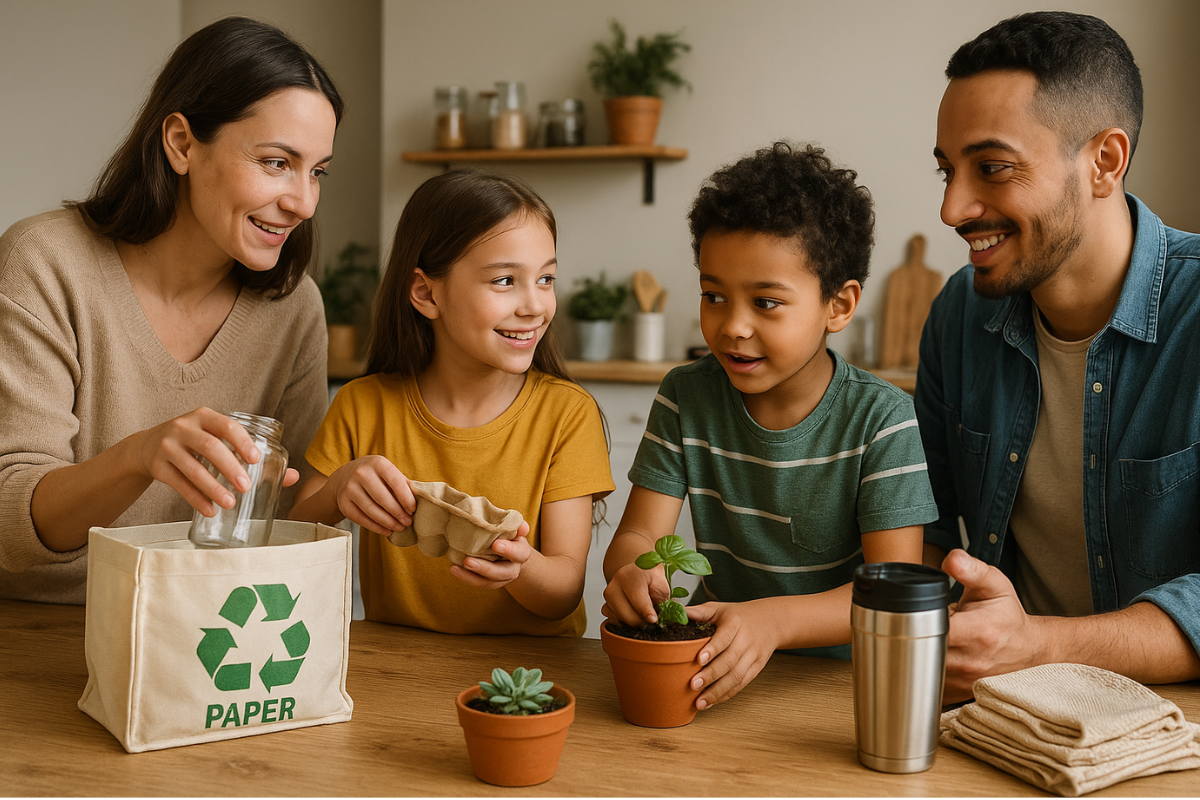Teaching children about sustainability isn’t just good for the planet—it builds empathy, responsibility, and lifelong habits. And the best part? You don’t need to be perfect or live zero-waste to raise eco-conscious kids.
By involving children in small, age-appropriate actions, you can help them grow up with a deep respect for nature and the understanding that their choices matter.
Why Start Young?
Children are naturally curious and observant. When they see you reusing, recycling, gardening, or talking about the environment, they absorb those values and begin to mirror them.
Benefits of eco-education:
- Encourages responsibility and independence
- Builds critical thinking skills
- Connects kids to nature and where things come from
- Promotes gratitude and mindfulness in daily life
Sustainability becomes a mindset—not just a subject in school.
Lead by Example
Kids learn best by watching. Your actions are more impactful than lectures.
Try this:
- Recycle together and explain why
- Turn off lights when leaving the room
- Bring reusable bags and bottles on outings
- Repair items instead of throwing them away
- Say no to plastic freebies
Narrate your choices in simple, honest language: “We bring this bottle so we don’t need to buy a plastic one.”
Create Eco-Friendly Routines at Home
Sustainable habits can be fun, not forced. Start with small changes that fit naturally into your family’s daily life.
Family-friendly routines:
- Compost food scraps together
- Sort laundry with cold water and eco detergent
- Use cloth napkins instead of paper ones
- Cook at home and reduce takeout packaging
- Read books about nature or watch environmental documentaries
Let kids be involved—they’re more likely to care about what they helped create.
Turn Chores Into Learning Opportunities
Sustainability can be built into everyday responsibilities.
Examples:
- Let kids water the plants or help grow vegetables
- Encourage them to clean up using natural products
- Teach them to separate trash, recycling, and compost
- Have them donate old toys or clothes to others
Celebrate their efforts, no matter how small. Praise builds enthusiasm and pride.
Make Sustainability Playful
Learning through play is powerful—especially for younger children.
Fun eco-activities:
- Build bird feeders from recycled materials
- Make toys or crafts using cardboard and fabric scraps
- Start a nature journal to record animals and plants
- Have a “no electricity” evening with candles and board games
- Create a recycling race game or compost bingo
When kids associate sustainability with fun, they develop a lasting connection.
Explore Nature Together
Connection to nature nurtures care for the planet.
Activities to deepen that connection:
- Walk barefoot on the grass or sand
- Go on hikes or park adventures
- Collect leaves or stones for art projects
- Observe bugs, birds, and clouds
- Practice quiet listening in a natural space
Ask open questions like: “What do you notice? What do you hear?”
Choose Kid-Friendly Sustainable Products
You don’t need to buy everything new or “eco-labeled,” but when it’s time to shop, opt for more conscious options.
Smart swaps:
- Reusable water bottles and lunchboxes
- Bamboo toothbrushes
- Cloth diapers or reusable swim diapers
- Non-toxic, refillable art supplies
- Wooden or fabric toys instead of plastic
Buy second-hand when possible—kids outgrow things quickly!
Teach the Value of “Enough”
Sustainability also includes mental and emotional balance.
Help kids:
- Understand that happiness isn’t about having more
- Practice gratitude for what they already own
- Make mindful decisions when wanting something new
- Value repair, sharing, and creativity
These lessons plant seeds that grow into thoughtful, grounded adults.
Include Kids in Decision-Making
Give children age-appropriate choices and responsibilities. When they have a say, they feel more invested.
Let them:
- Choose reusable lunchbox designs
- Pick recipes for Meatless Mondays
- Help sort groceries into bulk jars
- Decide how to reuse packaging
Empowerment leads to engagement.
Grow a Greener Generation
Raising eco-conscious kids doesn’t require a perfect lifestyle. It’s about building awareness, curiosity, and care—one small moment at a time.
When sustainability becomes part of your family’s rhythm, kids grow up with the belief that protecting the earth is natural, joyful, and important. And that’s a lesson that lasts a lifetime.
